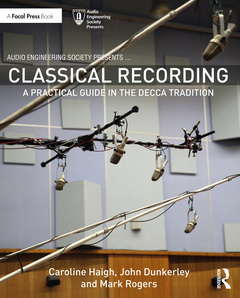Classical Recording A Practical Guide in the Decca Tradition Audio Engineering Society Presents Series
Auteurs : Haigh Caroline, Dunkerley John, Rogers Mark

Classical Recording: A Practical Guide in the Decca Traditionis the authoritative guide to all aspects of recording acoustic classical music. Offering detailed descriptions, diagrams, and photographs of fundamental recording techniques such as the Decca tree, this book offers a comprehensive overview of the essential skills involved in successfully producing a classical recording. Written by engineers with years of experience working for Decca and Abbey Road Studios and as freelancers, Classical Recording equips the student, the interested amateur, and the practising professional with the required knowledge andconfidenceto tackle everything from solo piano to opera.
Acknowledgements
Introduction
Glossary of Terms, Acronyms, and Abbreviations
PART I – Before Recording
- Acoustics and The Recording Venue
- Studio Techniques and Working On Location
- Basic Two-Microphone Stereo Techniques
- Solo Instruments
- The Piano
- Voice: Solo and Accompanied
- Solo Instruments and Piano
- The Decca Tree
- Ancillary Microphones
- Surround Sound Techniques
- Solo Instruments and Orchestra
- Chamber Ensembles
- Wind, Brass, and Percussion Bands
- Organ
- Choirs
- Solo Voice, Orchestra and Choir
- Mixing
- Editing and Post-Production
- Mastering
PART II – Recording
PART III – After The Recording Session
Appendices
Bibliography and Further Reading
Index
Caroline Haigh grew up with equal love for music, maths, and physics and combined study of all of them on the Tonmeister course at the University of Surrey. She began her career in classical post-production working for Decca during her final year at University, and stayed there for several years before moving around the corner to Abbey Road Studios (EMI) in 1996. At both Decca and EMI, she gained experience with countless major classical artists and became a sought-after and skilful editor, working on several Grammy award-winning albums, including Les Troyens (Decca – OSM/Dutoit) Best Opera 1995. Having enjoyed giving guest seminars at the University of Surrey during her time at Abbey Road, Caroline was recruited to teach on the Tonmeister course on a permanent basis from 2009. She currently teaches recording techniques, production/post-production skills and electro-acoustics (microphones), and she continues to work as a freelance classical editor.
John Dunkerley is one of the world’s most highly respected and emulated classical recording engineers. Throughout a long career at Decca and then as a freelancer, his recordings have been renowned for their ravishingly beautiful sound and attention to detail. He has worked with almost all the major artists of the last 40 years, has made over a thousand CDs, and his recordings have earned over 15 Grammy awards. John is one of the last engineers alive to have learnt his craft from the great Kenneth Wilkinson, the inventor of many of the techniques that underpin the classical recording art. John teaches workshops at the University of Surrey, at the Banff Centre, and at the Abbey Road Institute.
Mark Rogers studied on the Tonmeister course at the University of Surrey. He began his career working with John Dunkerley at Decca, and then spent nine years around the corner at EMI’s Abbey Road Studios, where he was the chief technical engineer for Studio One, famous for its orchestral and
Date de parution : 10-2020
19.1x23.5 cm
Date de parution : 10-2020
19.1x23.5 cm
Disponible chez l'éditeur (délai d'approvisionnement : 14 jours).
Prix indicatif 160,25 €
Ajouter au panierThèmes de Classical Recording :
Mots-clés :
Spot Microphone; Ribbon Microphones; Decca Tradition; ORTF Pair; Decca Recording; Decca Tree; Post-production for classical music; Artificial Reverb; Classical Recording; Main Pickup; Orchestral Recording; Playback; AES Presents; Royer R-121; Classical Piano recording; Piano Microphones; Chamber Music Recording; Wide Cardioid; Choral Recording; Spaced Omnis; Opera Recording; Room Tone; Mastering for classical music; DPA; classical recording on location; Soloist’s Microphones; Caroline Haigh; Image Width; John Dunkerley; Directional Microphones; Mark Rogers; Microphone Placement; Studio Layouts; Reverb Tails; acoustic classical music recording; Reverb Unit; Co-incident Pair; Omnidirectional Microphones; Wind Ensembles; Fundamental Frequencies; Sir Georg Solti



